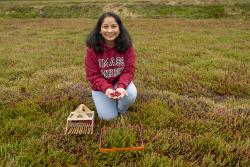
Sai Sree Uppala focuses on cranberry pathology at the UMass Cranberry Station in Wareham. She is intrigued by the resilient and unique nature of cranberries compared to most other agricultural crops. (She’s also struck by the resilience of the cranberry growers as well.) As Uppala communicates with growers, she gets the sense of so much passion and emotional connection with their crop.
Dr. Uppala studies various factors that affect disease occurrence and management in cranberries. Knowledge of plant-microbe-environment-human interactions is vital for her to devise disease management strategies. Through her extension efforts, she visits bogs to help growers diagnose diseases, develop educational and outreach materials and communicate disease management guidelines at meetings. Growers also drop off plant samples at the Cranberry Station diagnostic lab for disease identification and management guidelines. Her primary goal is to develop novel, environmentally-friendly, cost-effective, and sustainable integrated disease management strategies for organic and conventional production systems.
Personal Investment and Empowerment of Others
Uppala grew up in a small village, Korumamidi, in Southern India. She says, “Whatever achievements or awards I have ever received or will receive, my favorite will always be, “the first girl from my village to receive a doctorate.’ ” Her family pursued farming and agricultural-related trade for the past five generations. Uppala continues, “Stepping out of my village was a big step out of my comfort zone because most of my friends got married right after they graduated from high school, which was generally the norm there. My dream used to be to get a bank job and get married to a guy with a bright red Maruti car. As I reflect on my journey it is amazing how dreams evolve (from a bright red Maruti car to researching beautiful bright red cranberries).
“My parents were very supportive of my and my sister’s education. I was the first girl in our family and our village to study outside our state — and I became the first person in our family and village to receive a doctorate. As a naïve, 22 year-old girl, I took my first ever flight to come to the United States to pursue a PhD in the U.S. The past twelve years have been full of experiences, challenges and opportunities.” She becomes philosophical, saying that most of her inspiration comes from plants and simple people who endure harsh realities without losing the smile on their face. If her father and mother, who own a two-acre coconut farm in a small village, could dream of educating her, then she could become a passionate scientific researcher. She always believed she could dream big.
In the 21st century, in a world that celebrates achievements of women, Uppala grew up with several girls who were smarter and full of vision, but who were not able to spread their wings because of gender discrimination and restrictions. She says, “I am working towards enabling as many girls and women as I can to achieve their dreams. I believe every girl/women deserve as much freedom as a boy/men receive to pursue their dreams. I am who I am because of my education and the inspiring people I met on this path. In the past decade, my time at some of the best agricultural universities in the US (at Auburn University, Oregon State University, Texas A&M University and University of Massachusetts) provided me with many opportunities that I would never have known existed.”
She and her husband, Dr. Madan Mohan Chapala, a plant breeder, are passionate about helping farmers across the world. They are well aware of the struggles farmers face and they are working on some ideas to reach out and assist farmers with our science- based solutions. They have a daughter, Mona (2 years old), who already loves spending time at her grandparent’s farm. Uppala enjoys learning about various cultures and is interested in world travel.